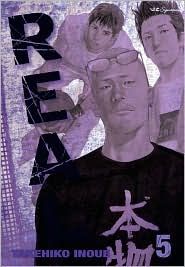It would be very reductive to simply call Takehiko Inoue's -- also the creator of Slam Dunk and Vagabond -- REAL "that wheelchair basketball" manga. In reality, the title is a thoughtful portrait of three men in varying states of recovery from both physical and psychological trauma.
In spite of the fact that by taking the topic of disability and recovery REAL might scream to some readers that "THIS IS IMPORTANT STUFF SO PAY ATTENTION!", the narrative is actually quite understated in many respects. Not everyone on the path to recovery is necessarily physically disabled -- Nomiya, a bit of young tough, has to come to terms with the fact his actions have cost a young woman the cost of her legs. He's there to bridge the other stories of two disabled men -- the talented sportsman Togawa, who has recovered from the cancer which took one of his legs, and the proud and vain Nobu, who has only recently been paralyzed in an accident.
Each individual is in completely different states of recovery as volume five finds Togawa at the head of the pack as he prepares to join a national basketball wheel chair team. Meanwhile, able-bodied Nomiya struggles to find the courage to drive again after his previous experiences as the driver on a motorcycle have cost another human being so much. Finally, Nobu struggles to find the will to simply sit up in bed. Nomiya is probably the most likeable character since his guilt is so sincere and we can all understand his desire to try to make amends.
In contrast, Nobu's nasty character flaws may actually reflect some our darker assumptions about ourselves born of the freedom from NOT having ever experienced long-term suffering. Nobu is obsessed with the issue of rank -- before his accident he was constantly rating who was the best intellectually and physically in his class, and he believed himself to be at the top in spite of his somewhat humble social circumstances (just more proof, as far as he's concerned, that he really is *great* -- if a deadbeat dad and a working class mom haven't stopped him it is hard to imagine that anything could). His usual arrogance takes a heavy hit thanks his new experience of pain, suffering and immobility, and he takes out his pain on the people around him -- he lashes out at his mother and therapists -- while also saving a healthy does of hatred for himself. Nobu's story is the most painful and the most compelling of the three because if we put ourselves in his shoes it is hard to imagine that we would be any braver or kinder to ourselves and those around us than he is.
If REAL has any faults is that the stories don't dovetail is neatly as they could. They are clearly thematically linked but the three main characters seem to touch each others' lives all too briefly. I'm curious to see how these three recovery stories intersect -- if they do at all -- in future volumes.
Review copy provided by Viz.


